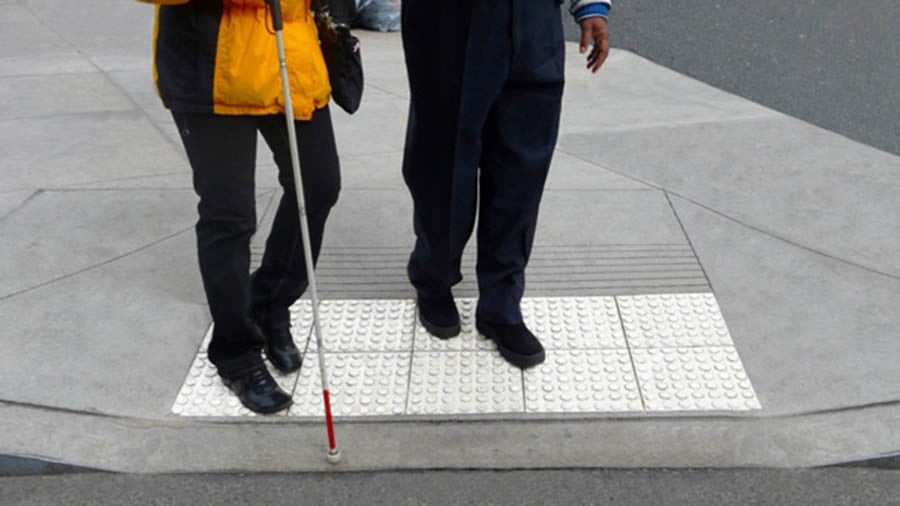
The built environment of our society needs to make room for the disabled to enjoy fundamental freedoms and rights as is the case in many countries

Whenever people come across a disabled person, they start invading their personal spaces by discussing disability condition. Whether educated or illiterate, they find the disabled to be the objects of their curiosity and start satisfying their sense of curiosity with bombardment of question. During such an interaction, they not only display lack of respect for the privacy of an individual, they also demonstrate paper thin grasp of disability condition.
The moment the disabled person comes across a stranger, they know that the navel gazing about their disability condition is about to start any given moment and strangers always oblige. "Have you been blind by birth or did you lose sight afterwards"? This is followed by the question as to whether you consulted some doctor? Those who are a bit wiser ask a leading question like ‘obviously you must have seen some doctor’? After they are done with such preliminaries, they tell a disabled person why he or she is disabled.
Generally, they find explanation in the will of God which is followed by the unsolicited advice as to how the disabled person could get rid of the disability condition. The remedial measures that are suggested include, but are not limited to, visit to a saintly figure who lives on the top of a mountain, behind it or beside it and his miraculous healing powers are described in great details. Some even offer to take the disabled person to the saint at their own expense and time. Others give reference of some hakeem or doctor.
During the conversation, it is clear even to a blind person, (the expression being used here in literal sense and not in figurative sense as is often done by sighted folks to drive home a point), as to what a pitiable object the blind person has turned out to be. The heaving sighs and the tone and tenor of their sounds give away their feelings of pity for the person on other end of the conversation. It is not a good place to be in where you are reduced to an object to be pitied upon without your will or volition because of a physical impairment that is part of your very being and likely to be with you for the rest of your life.
This invasion of personal spaces is widespread and not restricted to the disabled alone. Women experience it when they are stared at when they go about doing their business in public spaces. The transgender people are mocked at, ridiculed and often even abused in public spaces just because of what they are. In short, women, the disabled and transgender people are reduced to be mere objects in our society.
The lack of respect for privacy is intrinsically linked with our lack of respect for human diversity. I have yet to see a six-year-old child showing disrespect to a woman, transgender person or a disabled for being a woman, transgender or disabled. Children have the innate wisdom to appreciate human diversity. Instead of inculcating respect for human diversity through civic education, the ‘normal’ and ‘acceptable’ individual our society ends up creating through formal and informal education is the one who appreciates human beings based on their nationalities, castes, colour, creed, sect, gender and physical characteristics. In this trade-off, everybody ends up suffering to varying degrees but for some, the suffering becomes part and parcel of their lives.
Obviously, there is no consolation for the disabled, women and the transgender persons whose privacy is invaded on daily basis in the fact that everybody suffers to varying degrees in our society for the general lack of respect for human diversity.
Inaccessibility of the built environment which actually renders wheelchair users and the blind disabled is directly proportional to the curiosity of people about the disabled, bordering on intrusion in their private spaces. Even the ministers have been seen explaining disability condition from their own peculiar understanding of divine justice system instead of focussing on removing access barriers that put restriction on the abilities of the disabled to exercise their basic rights such as access to education, healthcare and gainful employment etc. on equal basis with others.
The disabled are not here merely to serve to explain intricacies of the divine justice system, to be pitied upon or to be taken inspiration from. The disabled are part of human diversity and the attitudes and the built environment of our society will have to make room for reasonable accommodations to ensure that they enjoy fundamental freedoms and rights as is the case in many countries.
Media can play a pivotal role in creating a barrier-free society for the disabled provided it resists the temptation of indulging in what is described as ‘inspiration porn’, which will be the subject of the next piece.